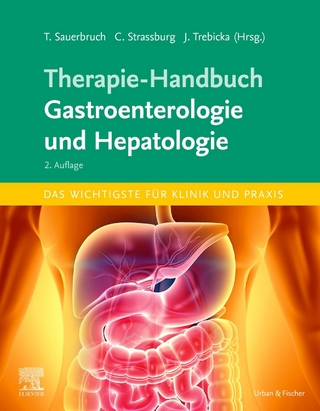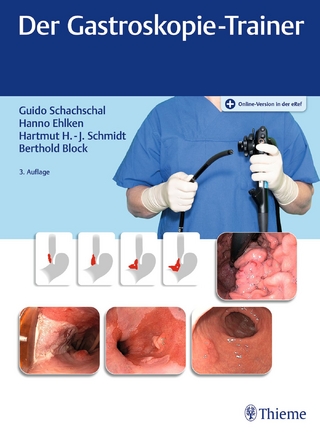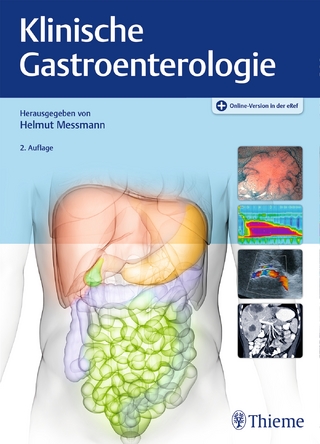
Psychogastroenterology for Adults
Routledge (Verlag)
978-0-367-19656-1 (ISBN)
Timely and accessibly written, this book provides a unique, comprehensive introduction to psychogastroenterology, offering a step-by-step guide to evidence-based psychological treatment protocols. Broad in scope and expertise, the book is divided into four parts. It opens with an overview of the field, moving on to outline psychological concerns and conditions in gastroenterological (GI) cohorts. Further, it covers various approaches to psychogastroenterology, including psychopharmacological and eHealth practices. In closing, the book looks to the future, providing guidance on supervision in psychogastroenterology, and exploring challenges in the field.
Written by experts in the field, this book will be an indispensable resource for those who wish to enhance their knowledge and practice of psychogastroenterology in the mental health profession, including psychologists, psychiatrists, psychosomatic medicine specialists, nurses and social workers.
Dr Simon R. Knowles is a Senior Lecturer and Clinical Psychologist based at Swinburne University of Technology, Melbourne. His clinical and research interests relate to the biological and psychological interactions of GI conditions and the brain-gut axis. Dr Knowles has published over 90 articles/book chapters and developed several free online psychological resilience programs for GI conditions. Dr Laurie Keefer is a GI Psychologist and Associate Professor of Medicine at the Icahn School of Medicine in NYC. She studies resilience, self-efficacy and optimism in the management of complex GI conditions. She has published over 100 papers and serves on the Board of Directors for the Rome Foundation. Dr Antonina A. Mikocka-Walus is a GI Psychologist and Associate Professor in Health Psychology at Deakin University, Melbourne. She has published over 100 research papers/book chapters. Her interdisciplinary research has contributed to the recent guidelines on the management of inflammatory bowel disease in Australia, North America and Europe.
Foreword by William E. Whitehead; Part 1: Introduction to gastrointestinal physiology and conditions, the brain-gut axis, and working within health care teams; Chapter 1: The gastrointestinal tract: A brief introduction to healthy digestion by Dr Christopher F.D Li Wan Suen and Dr Peter De Cruz; Chapter 2: The upper gastrointestinal tract, common conditions and recommended treatments by Professor Geoff Hebbard; Chapter 3: The lower gastrointestinal tract, common conditions and recommended treatments by Dr Rebecca Burgell and Dr Bei Ye; Chapter 4: Gastroenterological cancers and stomas by Professor Timothy Pearman and Dr Elizabeth L. Addington; Chapter 5: Stress and the brain-gut axis across the spectrum of digestive disorders by Dr Gregory Sayuk; Chapter 6: Working with gastroenterologists, health administrators, and other members of the gastrointestinal and allied health care team by Dr Sarah W. Kinsinger; Part Two: Psychological concerns and conditions in gastroenterological cohorts; Chapter 7: Common gastrointestinal investigations and psychological concerns by Dr Tuan Duong and Professor Jane M. Andrews; Chapter 8: Common psychological issues in gastrointestinal conditions by Associate Professor Antonina Mikocka-Walus, Ms Catherine Emerson, Dr Lisa Olive and Dr Simon R. Knowles; Chapter 9: Working with complex patients with gastrointestinal and psychological concerns Dr Emily Edlynn and Dr Tiffany Taft; Part Three: Psychological, psychopharmacological, and eHealth approaches in psychogastroenterology; Chapter 10: Psychological assessment, formulation, and intervention planning in gastrointestinal cohorts with psychological issues by Dr Philip Keightley and Dr Simon R. Knowles; Chapter 11: Promoting change in psychological and gastrointestinal conditions - motivational interviewing (MI) by Dr Daron A. Watts, Dr Hans R Watson and Professor Terry L. Correll; Chapter 12: Promoting change in gastrointestinal conditions - Solution-Focused Brief Therapy (SFBT) by Assistant Professor Anne Lutz and Dr Christiaan van Woerden; Chapter 13: Stress management and mindfulness-based stress reduction (MBSR) approaches to gastrointestinal conditions by Anjali U Pandit and Dr Sarah Ballou; Chapter 14: Cognitive behavioural therapy (CBT) approaches to gastrointestinal conditions by Ms Karen J. Conlon and Associate Professor Laurie Keefer; Chapter 15: Hypnosis approaches to gastrointestinal conditions by Dr Megan E. Riehl; Chapter 16: Psychodynamic-interpersonal therapy (PIT) approaches to gastrointestinal conditions by Professor Elspeth Guthrie; Chapter 17: Emerging approaches - acceptance and commitment therapy (ACT) approaches to gastrointestinal conditions by Associate Professor Nuno Ferreira; Chapter 18: Behavioural approaches to managing substance-related problems in gastrointestinal conditions by Professor Eva Szigethy and Dr Trent Emerick; Chapter 19: Psychopharmacology in gastrointestinal cohorts by Ms Elspeth Carruthers and Dr Juilan Stern; Chapter 20: The role of eHealth in psychogastroenterology by Dr Andrew McCombie and Dr Simon R. Knowles; Part 4: Supervision and future challenges in psychogastroenterology; Chapter 21: Supervision and future challenges in psychogastroenterology by Dr Simon R Knowles, Associate Professor Laurie Keefer and Associate Professor Antonina Mikocka-Walus; References; Index
| Erscheinungsdatum | 03.10.2019 |
|---|---|
| Zusatzinfo | 23 Tables, black and white; 12 Line drawings, black and white; 40 Halftones, black and white |
| Verlagsort | London |
| Sprache | englisch |
| Maße | 156 x 234 mm |
| Gewicht | 560 g |
| Themenwelt | Geisteswissenschaften ► Psychologie ► Klinische Psychologie |
| Geisteswissenschaften ► Psychologie ► Sozialpsychologie | |
| Medizinische Fachgebiete ► Innere Medizin ► Gastroenterologie | |
| Medizin / Pharmazie ► Medizinische Fachgebiete ► Psychiatrie / Psychotherapie | |
| ISBN-10 | 0-367-19656-5 / 0367196565 |
| ISBN-13 | 978-0-367-19656-1 / 9780367196561 |
| Zustand | Neuware |
| Haben Sie eine Frage zum Produkt? |
aus dem Bereich


